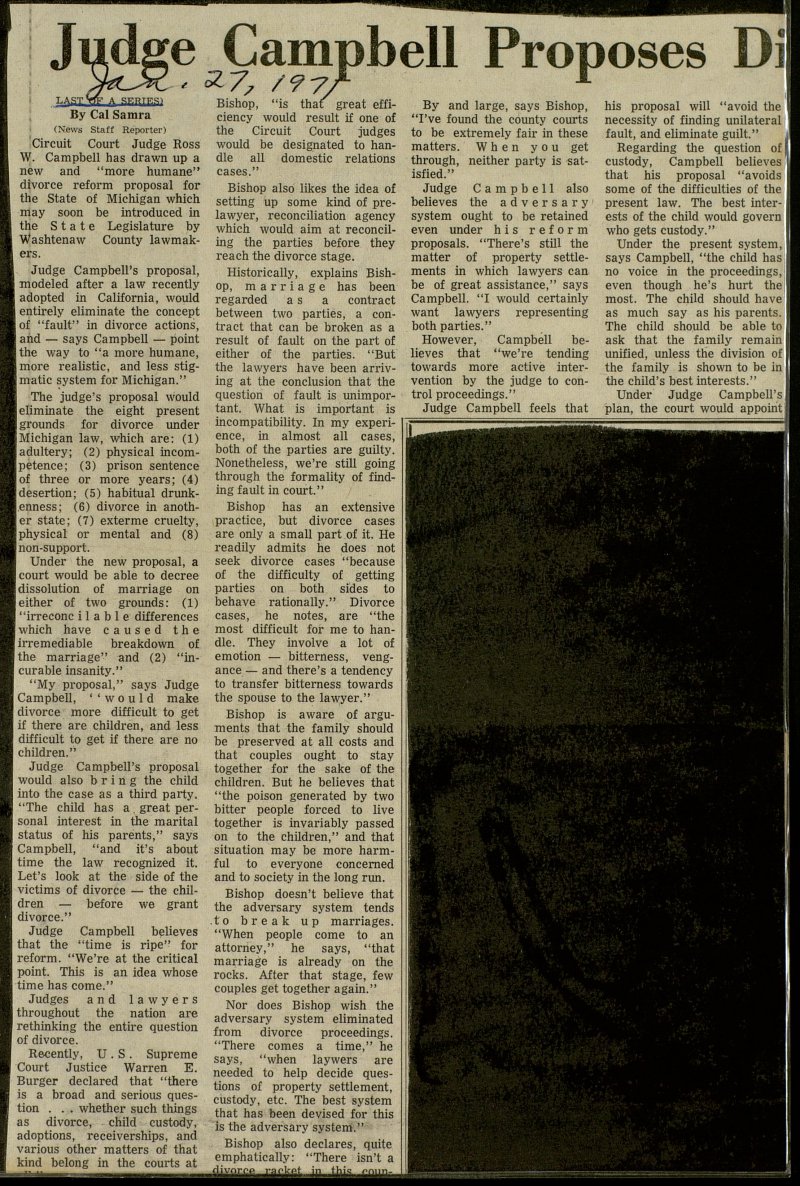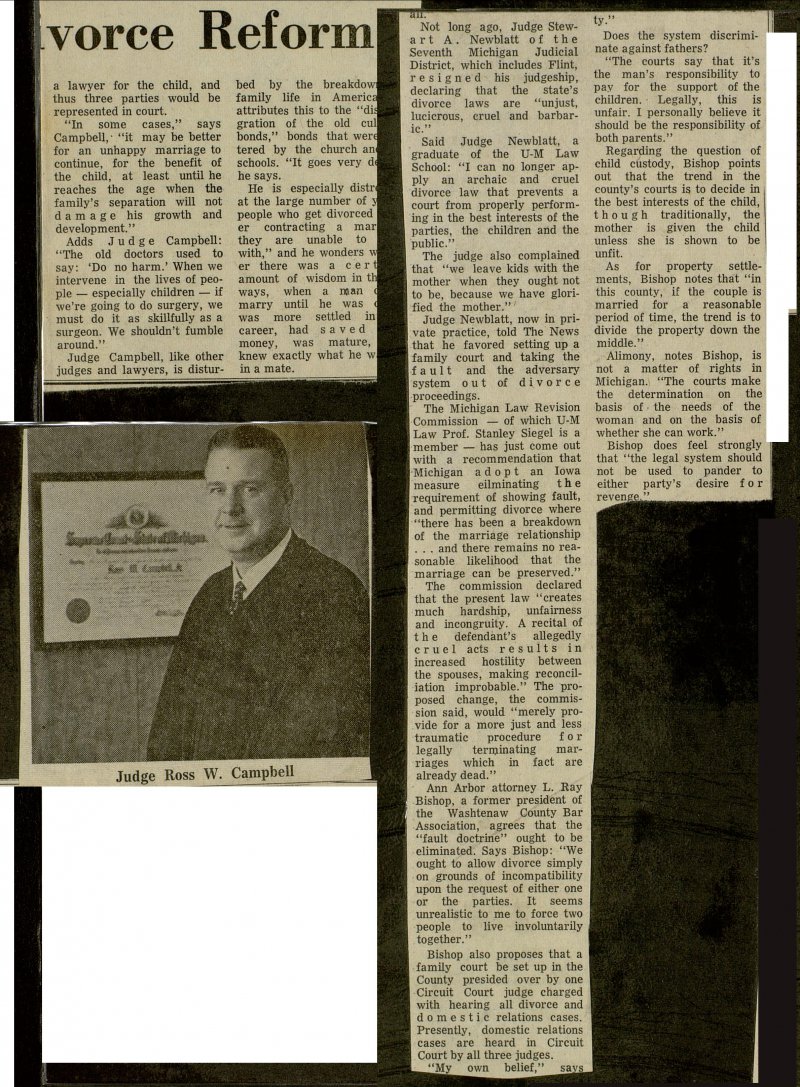Judge Campbell Proposes Divorce Reform


lastw1 a skrtf.si Circuit Court Judge Ross i W. Campbell has drawn up a new and "more humane" divorce reform proposal for I the State of Michigan which I may soon be introduced in I the State Legislature by I Washtenaw County lawmakI ers. Judge Campbell's proposal, I modeled after a law recently I adopted in California, would I entirely elimínate the concept ■ of "fault" in divorce actions, I and - says Campbell - point ■ the way to "a more humane, Bmore realistic, and less stigBmatic system for Michigan." The judge's proposal would ■ elimínate the eight present ■ grounds for divorce under I Michigan law, which are: (1) Badultery; (2) physical incom■ petence; (3) prison sentence lof three or more years; (4) Bdesertion; (5) habitual drunkl.enness; (6) divorce in anoth■ er state; (7) exterme cruelty, ■ physical or mental and (8) ■ non-support. Under the new proposal, a I court would be able to decree ■ dissolution of marriage on ■ either of two grounds: (1) I "irreconc i 1 a b 1 e differences ■ which have caused the I irremediable breakdown of I the marriage" and (2) "inI curable insanity." "My proposal," says Judge I Campbell, ''would make I divorce more difficult to get I if there are children, and less I difficult to get if there are no I children." Judge Campbell's proposal I would also b r i n g the child I into the case as a third party. I "The child has a . great perI sonal interest in the marital I status of his parents," says I Campbell, "and it's about I time the law recognized it. I Let's look at the side of the I victims of divorce - the chilI dren - before we grant I divorce." Judge Campbell believes I that the "time is ripe" for I reform. "We're at the critical I point. This is an idea whose I time has come." Judges and lawyers I throughout the nation are I rethinking the entire question I of divorce. Recently, U.S. Supreme I Court Justice Warren E. I Burger declared that "there is a broad and serious question . . . whether such things ' as divorce, child custody, adoptions, receiverships, and various other matters of that kind belong in the courts at Bishop, "is that great efficiency would result if one of the Circuit Court judges would be designated to handle all domestic relations cases." Bishop also likes the idea of setting up some kind of prelawyer, reconciliation agency which would aim at reconciling the parties before they reach the divorce stage. Historically, explains Bishop, marriage has been regarded as a contract between two parties, a contract that can be broken as a result of fault on the part of either of the parties. "But the lawyers have been arriving at the conclusión that the question of fault is unimportant. What is important is incompatibility. In my experience, in almost all cases, both of the parties are guilty. Nonetheless, we're still going through the formality of finding fault in court." Bishop has an extensive practice, but divorce cases are only a small part of it. He readily admits he does not seek divorce cases "because of the difficulty of getting parties on both sides to behave rationally." Divorce cases, he notes, are "the most difficult for me to handle. They involve a lot of emotion - bitterness, vengance - and there's a tendency to transfer bitterness towards the spouse to the lawyer." Bishop is aware of arguments that the family should be preserved at all costs and that couples ought to stay together for the sake of the children. But he believes that "the poison generated by two bitter people forced to live together is invariably passed on to the children," and that situation may be more harmful to everyone concerned and to society in the long run. Bishop doesn't believe that the adversary system tends to break up marriages. "When people come to an attorney," he says, "that marriage is already on the rocks. After that stage, few couples get together again." Nor does Bishop wish the adversary system eliminated f rom divorce proceedings. "There comes a time," he says, "when laywers are needed to help decide questions of property settlement, custody, etc. The best system that has been devised for this is the adversary system." Bishop also declares, quite emphatically: "There isn't a By and large, says Bishop, "I've found the county courts to be extremely fair in these matters. W h e n y o u get through, neither party is satisfied." Judge Campbell also believes the adversary system ought to be retained even under his reform proposals. "There's still the matter of property settlements in which lawyers can be of great assistance," says Campbell. "I would certainly want lawyers representing both parties." However, Campbell believes that "we're tending towards more active intervention by the judge to control proceedings." Judge Campbell feels that his proposal will "avoid the I necessity of finding unilateral fault, and elimínate guilt." Regarding the question of I custody, Campbell believes i that his proposal "avoids I some of the difficulties of the I present law. The best 1 ests of the child would govern I who gets custody." Under the present system, I says Campbell, "the child has I no voice in the proceedings, I even though he's hurt thel most. The child should have I as much say as his parents. I The child should be able to I ask that the family remain I unified, unless the división ofl the family is shown to be in I the child's best interests." Under Judge Campbell's I plan, the court would appointl a lawyer for the child, and thus three parties would be represented in court. "ín some cases," says "it may be better for an unhappy marriage to continue, for the benefit of the child, at least until he reaches the age when the family's separation will not d a m a g e his growth and development." Adds J u d g e Campbell: "The old doctors used to say: 'Do no harm.' When we intervene in the lives of people - especially children - if we're going to do surgery, we must do it as skillfully as a surgeon. We shouldn't fumble around." Judge Campbell, like other judges and lawyers, is bed by the breakdow family life in AmericaH attributes this to the "diM gration of the old culB bonds," bonds that wer tered by the church anfl schools. "It goes very dfl he says. He is especially distriB at the large number of fl people who get divorced I er contracting a marM they are unable to I with," and he wonders m er there was a c e r tfl amount of wisdom in thl ways, when a man l marry until he was (I was more settied ml career, had s a v e d t r money, was mature, I knew exactly what he w in a mate I Not long ago, Judge StewI art A . Newblatt of the I Seventh Michigan Judicial I District, which includes Flint, I resigned his judgeship, I declaring that the state's I divorce laws are "unjust, lucicrous, cruel and barbarI ie." Said Judge Newblatt, a I gradúate of the U-M Law I School: "I can no longer apI ply an archaic and cruel I divorce law that prevenís a I court from properly performI ing in the best interests of the I parties, the children and the I public." The judge also complained 1 that "we leave kids with the I mother when they ought not I to be, because we have gloriI fied the mother." Judge Newblatt, now in priI vate practice, told The News I that he favored setting up a ■ family court and taking the I f a u 1 1 and the adversary I system out of divorce I proceedings. The Michigan Law Revisión ■ Commission - of which U-M ■ Law Prof. Stanley Siegel is a ■ member - has just come out ■ with a recommendation that ■ Michigan adopt an Iowa I measure eilminating the ■ requirement of showing fault, '.■ and permitting divorce where I "there has been a breakdown I of the marriage relationship I ... and there remains no rea■ sonable likelihood that the I marriage can be preserved." The commission declared "I that the present law "creates I much hardship, unfairness I and incongruity. A recital of I t h e defendant's allegedly I cruel acts results in I increased hostility between I the spouses, making reconcilI iation improbable." The proI posed change, the commisI sion said, would "merely proI vide for a more just and less I traumatic procedure for I legally terminating marI riages which in fact are I already dead." Ann Arbor attorney L. Ray I Bishop, a former president of [ the Washtenaw County Bar I Association, agrees that the " j "fault doctrine" ought to be I eliminated. Says Bishop: "We I ought to allow divorce simply I on grounds of incompatibility I upon the request of either one I or the parties. It seems I unrealistic to me to force two I people to live involuntarily I together." Bishop also proposes that a I family court be set up in the I County presided over by one I Circuit Court judge charged I with hearing all divorce and I domestic relations cases. I Presently, domestic relations I cases are heard in Circuit I Court by all three judges. ''My own belief," says ty. Does the system discrimínate against fathers? "The courts say that it's the man's responsibility to pay for the support of the children. Legally, this is unfair. I personally believe it should be the responsibility of both parents." Regarding the question of child custody, Bishop points out that the trend in the county's courts is to decide in the best interests of the child, t h o u g h traditionally, the mother is given the child unless she is shown to be unfit. As for property settlements, Bishop notes that "in this county, if the couple is married for a reasonable period of time, the trend is to i divide the property down the middle." Alimony, notes Bishop, is not a matter of rights in Michigan. "The courts make the determination on the basis of ' the needs of the woman and on the basis of whether she can work." Bishop does feel strongly m that "the legal system should I not be used to pander to II either party's desire for 1 revenseH
Article
Subjects
Cal Samra
Washtenaw County Circuit Court
Washtenaw County Bar Association
University of Michigan Law School
University of Michigan - Faculty
United States Supreme Court
No-Fault Divorce
Michigan Law Revision Commission
Legislature - Michigan
Divorce
Children
Child Custody
Alimony
Has Photo
Ann Arbor News
Old News
Warren E. Burger
Stewart A. Newblatt
Stanley Siegel
Ross W. Campbell
L. Ray Bishop